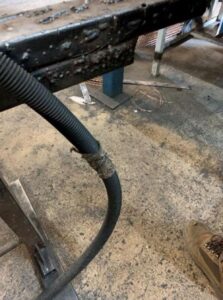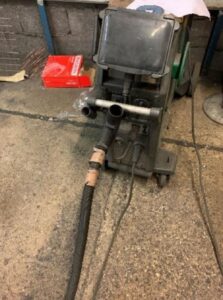Company fined as HSE inspection identifies failures
A manufacturing business in Lincolnshire has been fined for failing to protect its workers from hazardous substances.
A Health and Safety Executive (HSE) inspection of W.S. Barrett and Son Limited’s site at Riverside Industrial estate in Boston, Lincolnshire, found the company’s workers were being potentially exposed to welding fume and dusts from powder coating.
Welding fume is carcinogenic and can cause other serious illnesses such as occupational asthma. Exposure to coating powders can also cause occupational asthma and skin irritation.

The inspection on 25 March 2022 found that an on-tool extraction system on the welding tools was in a poor state of repair and that Local Exhaust Ventilation systems, provided to capture welding fume and dusts from powder coating in order to protect employees’ health, had not been thoroughly examined and tested.
A subsequent HSE investigation found W.S. Barrett and Son Limited, a specialist manufacturer for the agricultural and horticultural industries, had failed to ensure that its Local Exhaust Ventilation systems, which controlled workers’ exposure to welding fume and dusts from powder coating , had been thoroughly examined and tested.
The company had already been warned about its Local Exhaust Ventilation systems, during a previous HSE inspection on 13 February 2018, the company was served with Improvement Notices following issues with Local Exhaust Ventilation systems. The company failed to comply and was prosecuted as a result.

HSE guidance can be found at: Welding fume: protect your workers – Overview – HSE & Surface engineering – Reducing risks associated with using coating powders – employers (hse.gov.uk)
W.S. Barrett & Son Limited, of Marsh Lane, Boston, Lincolnshire, pleaded guilty to breaching Regulation 9(1) and Regulation 9(2) of the Control of Substances Hazardous to Health Regulations 2002. The company was fined £10,000 and ordered to pay £3,625.20 in costs at Lincoln Magistrates’ Court on 22 November 2023.
HSE inspector Stacey Gamwell said: “W.S. Barrett & Son Limited could have ensured that its Local Exhaust Ventilation systems were thoroughly examined and tested to ensure that they were working as intended to protect the health of its employees.
“This case highlights the importance of regular maintenance and inspection of control measures including Local Exhaust Ventilation, to ensure equipment remains in an efficient state, in efficient working order, in good repair and in a clean condition.”
This HSE prosecution was brought by HSE enforcement lawyer Jonathan Bambro.
Notes to Editors:
- The Health and Safety Executive (HSE) is Britain’s national regulator for workplace health and safety. We prevent work-related death, injury and ill health through regulatory actions that range from influencing behaviours across whole industry sectors through to targeted interventions on individual businesses. These activities are supported by globally recognised scientific expertise. hse.gov.uk
- More about the legislation referred to in this case can be found at: legislation.gov.uk/
- HSE news releases are available at http://press.hse.gov.uk

